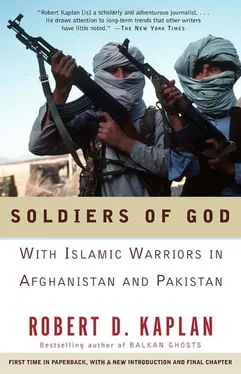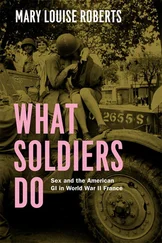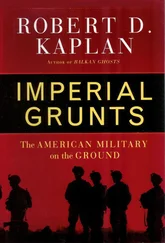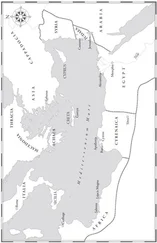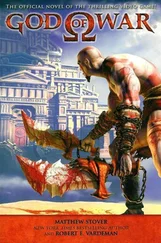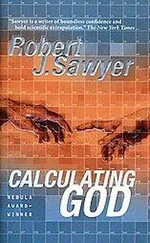What the television images did not translate was that despite their apparent primitiveness, as individuals the mujahidin were easy for a foreigner to talk to and befriend. There was none of the stiffness and forced probing that characterized relationships between Moslems and Westerners elsewhere. Because they had never been colonized, the Afghans didn’t have the fears and prejudices toward the West with which other peoples in the Orient are burdened. “After the lowering fanaticism of Meshed [in Iran],” wrote Bruce Chatwin, crossing into the mountains of Afghanistan “was like coming up for air.” In The Road to Oxiana, the 1937 classic considered the Ulysses of twentieth-century travel writing, Robert Byron, having just arrived from the Middle East, exclaimed about Afghanistan: “Here at last is Asia without an inferiority complex.” The Afghans seemed wonderfully straightforward, and journalists and relief workers took to them because in them we saw a stronger, more heroic version of ourselves.
Sympathizing with guerrilla movements is an occupational hazard of foreign correspondents everywhere, but the Afghans were the first guerrillas whom journalists not only sympathized with but actually looked up to. As romantic and unprofessional as this was, we were not the first Westerners to fall under the spell. Generation after generation of British colonial officials who had fought the Afghans in defense of the Northwest Frontier of British India had learned to admire and identify with their foes. Mountstuart Elphinstone, who led a mission to the court of Afghan ruler Shah Shuja in 1809, noted that the Afghans “have not that indifference to truth, and that style of habitual and gratuitous falsehoods, which astonishes a European… in India and Persia.” Sir Olaf Caroe, the last British governor of the Northwest Frontier, wrote, “For the stranger who had eyes to see and ears to hear,… here was a people who looked him in the face and made him feel he had come home.”
The British invaded Afghanistan three times, and on each occasion they were driven out. Out of an invasion force of 4,500 that retreated from Kabul in January 1842, only one man was left alive. Never had the British met such a formidable adversary. This forced them to meet the Afghans on an equal plane without a trace of condescension.
Kipling paid the ultimate tribute to the Afghans in “The Ballad of East and West.” Because of its simple truth and catchy rhythm, the poem’s first line, “Oh, East is East, and West is West, and never the twain shall meet/ ‘has become a cliché. But read in its entirety, the ninety-six-line epic tells the story of how a friendship is forged between the son of a British colonel and an Afghan brigand named Kamal, whom the colonel’s son was sent to capture.
They have looked each other between the eyes, and there they found no fault.
They have taken the Oath of the Brother-in-Blood on leavened bread and salt:
They have taken the Oath of the Brother-in-Blood on fire and fresh-cut sod,
On the hilt and haft of the Khyber knife, and the Wondrous Names of God.
Kipling, whose imperialism is often misunderstood by modern readers, ends the story with this uplifting truth:
…there is neither East nor West, Border, nor Breed, nor Birth,
When two strong men stand face to face, though they come from the ends of the earth!
The poem, which was published in 1889, captures the spirit of the naive and idealized friendships that existed one hundred years later between mujahidin commanders and some extremely brave journalists and relief workers whom I knew in Peshawar.
Kamal, the hero of Kipling’s poem, was more than just an Afghan. He was a Pathan (pronounced “pah-tahn”), as were most of the mujahidin and the Afghans whom the British encountered on the Northwest Frontier. The Pathans are the largest ethnic group in Afghanistan (one of every two Afghans is a Pathan) and the largest existent tribal society in the world. They live by a medieval code of honor called Pukhtunwali and have given the country all of its kings and polical leaders. Until recent decades, in fact, “Pathan” and “Afghan” have been synonymous. The Pathans inhabit a huge arc of territory in the eastern, southern, and southwestern part of Afghanistan. They speak Pukhtu, an Aryan tongue that borrows much from Persian and Hindustani, and employs Arabic script. R. T. I. Ridgway, an officer in the British colonial service, described Pukhtu as “a stong virile language, capable of expressing ideas with neatness and accuracy.” Actually, the Pathans prefer to call themselves Pukhtuns, or Pushtuns if they live in southern Afghanistan, where their accent is softer. But the name Pathan, first used by the Indians to describe the Afghans on the Northwest Frontier, has become commonly accepted.
The origins of the Pathans are shrouded in myth. By various accounts, they are descended from the ancient Hebrews, from an Aryan race called the White Huns, and from the Greek troops of Alexander the Great who passed through Afghanistan in the fourth century B.C. Pathan genealogies read like tracts from the Old Testament. According to one legend, the Pathans are descendants of Afghana, a grandson of the Israelite king Saul, whose ancestors were carried away from Palestine by Nebuchadnezzar, the Babylonian king, and planted as colonists in Persia, from where they migrated eastward to present-day Afghanistan. The name Afghana cannot be found in the Hebrew Bible, but many Pathans still believe the story. Even more believe themselves to be Aryans, but all will admit that they are not certain of their own ancestry.
Almost every one of Afghanistan’s twenty-odd ethnic groups took part in the struggle against the Soviets, but it was the Pathans who gave the resistance its mythic, larger-than-life quality, its lack of political pretensions, and its chivalry — as well as its primitiveness, tribal disorder, and recklessness. Only Pathans could have invented a game that requires a man to pick up a butterfly mine and toss it in the air without losing a hand (not all succeeded). Only Pathans could make walking through a minefield a test of manhood.
The Pathans are a purer, crystallized version of everything that is good and bad in the Afghan character. More than any other single factor, it was their harsh and unforgiving tribal culture, free of subtleties and introspection and unaffected by the modern world, that defeated the mines and other weapons of the Soviet invaders. As the seventeenth-century Pathan poet Khushal Khan Khatak wrote:
The very name Pukhtun spells honor and glory,
Lacking that honor, what is the Afghan story?
1

Frontier Town
THE CEILING FAN rattled like an airplane propeller in the breathless, mud-baked heat of the room, blowing new, crisp 100-afghani notes all over the floor. The money changer in the Peshawar bazaar had handed me the notes in heaps of 10,000. The afghani was devaluing fast. For years already, in one of the CIA’s most successful covert operations, millions of counterfeit afghanis had been printed in order to wreck the Kabul regime’s economy and allow the mujahidin to buy weapons and ammunition on the open market on the Northwest Frontier. But the CIA program wasn’t good enough for the KGB. Near the end of the war the Soviets, needing to handcuff the Afghan economy to their own in the wake of a troop withdrawal, started buying up vast amounts of U.S. dollars on the black market in Kabul, driving down the afghani further in order to make Western products prohibitively expensive for the Afghan population. So there I sat, sweating on a sagging jute bed with a draft at my back, stuffing stacks of possibly counterfeit money into my rucksack, just to pay for a mule in case I got sick.
Читать дальше
